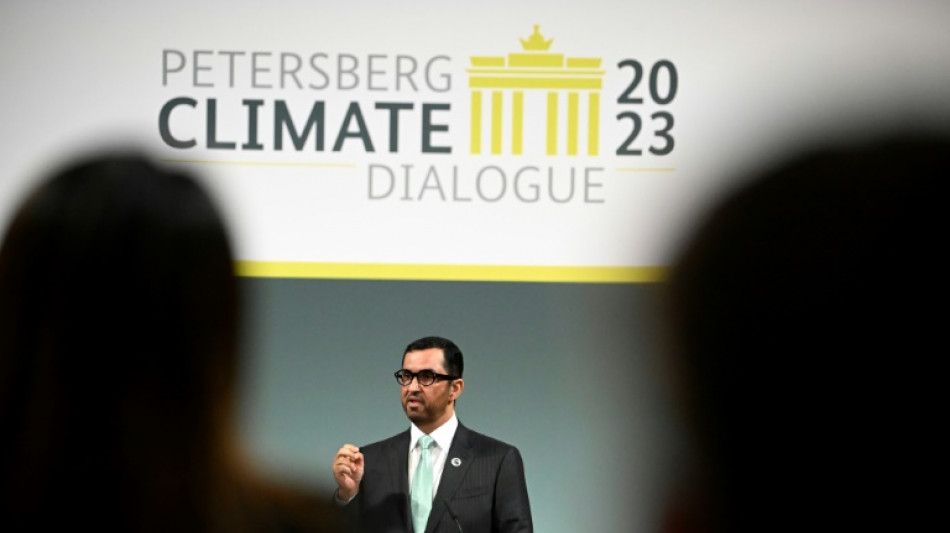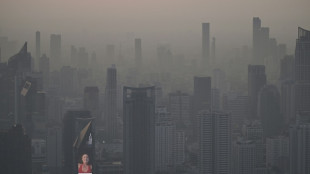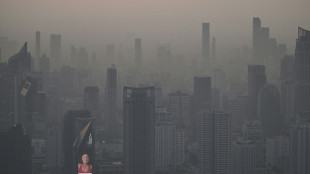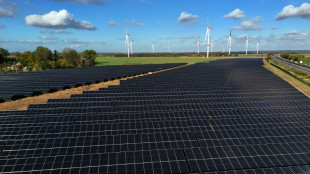

COP28 chair urges tripling of renewables capacity by 2030
The president of upcoming UN climate talks Sultan Al Jaber on Tuesday called on participants to drastically ramp up their use of renewable energy ahead of the key summit in the United Arab Emirates later this year.
The meeting in November needs "ambitious, transparent and accountable commitments from countries and businesses", Al Jaber said in a speech at the opening of the Petersberg Climate Dialogue, a meeting of climate diplomats in Berlin.
"We will accelerate delivery in sectors like renewables that must triple capacity by 2030 and double it again by 2040," he added.
The summit chief's call echoes a key target laid out by the International Energy Agency.
Al Jaber had already raised the potential target at a closed-door meeting with G7 leaders in Japan last month.
While setting out a goal for faster renewables expansion, Al Jaber, who is also the chief executive of the UAE's state oil company, did not call for a complete end to the use of fossil fuels.
Rather, the future COP28 chair said the focus must be on removing the emissions such fuels produce.
"We must be laser focused on phasing out fossil fuel emissions, while phasing up viable, affordable zero-carbon alternatives," said Al Jaber.
Climate activists have criticised the decision to hold COP28 in the oil-rich UAE and the choice as COP president of Al Jaber, who also serves as the Gulf state's minister of industry and advanced technology.
- Climate fund -
Al Jaber also used his speech to call on developed countries to deliver a long promised $100-billion climate package for developing countries.
"This is holding up progress. And as part of my outreach, I am requesting donor countries to provide a definitive assessment on the delivery of this commitment before COP28," Al Jaber said.
In 2009, the chaotic UN climate summit in Copenhagen saw rich nations promise $100 billion a year by 2020 to the Global South, but last year the OECD said the amount delivered was still $17 billion short.
At the same time, the funding needed for developing countries to stop burning planet-heating fossil fuels and prepare for future climate disasters has already far outstripped that sum.
Campaigners are pushing for a redesign of the global financial architecture to help countries cope, as many emerging nations grapple with rising costs, soaring debts and extreme weather events.
German Foreign Minister Annalena Baerbock, who is hosting the Petersberg dialogue, however, reported that the pledged sum may finally be close.
"The good news is we are on the way to finally reaching this $100-billion sum this year," she said.
- Protest group -
Earlier this year, the UN’s climate expert panel said the world risks crossing the key 1.5-degree Celsius global warming limit in about a decade, urging a drastic reduction in planet-heating emissions.
While solar and wind power are already increasing dramatically, the UN report said that existing fossil fuel infrastructure will be enough to push the world beyond 1.5C, without the effective use of costly and emerging technology to capture and store the carbon pollution.
The meeting in Berlin came as the German capital was roiled by days of climate protests, with the action continuing Tuesday.
Campaigners from the Last Generation group have caused widespread disruption in the city by sticking themselves to the road surface to stop traffic and agitate for more climate protection.
Among other measures, Last Generation has called for the government to provide a "detailed plan" to meet the goal of a 1.5C-limit and introduce a general speed limit.
Representatives from the group met Germany's Transport Minister Volker Wissing on Tuesday.
Wissing said on radio Deutschlandfunk that he was surprised the activists "make so few sensible suggestions for climate protection and at the same time act so radically".
burs-sea/hmn/kjm
W.Prendergast--NG



